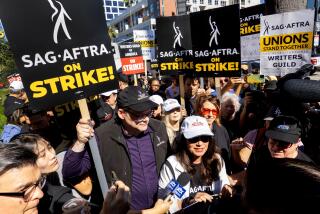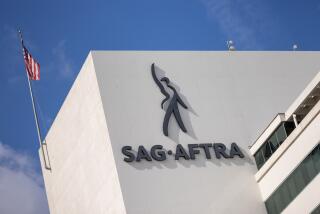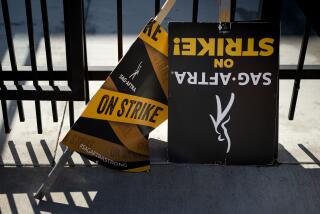Producers Guild lays out guidelines to combat Hollywood sexual harassment
On the eve of the first glitzy Producers Guild Awards ceremony to be held since the Time’s Up campaign began, the Producers Guild of America has unveiled comprehensive anti-sexual harassment guidelines to its 8,200 members with a clear credo: Ensuring safety on film, television and new media sets by ending a culture of harassment in Hollywood is the responsibility of producers – full stop.
Drafted by an internal task force of PGA members working to find concrete solutions to the widespread abuses afflicting the industry, the guidelines are a first step in an ongoing effort by the group to lead Hollywood into a new era of accountability after decades of sexism, harassment and abuse primarily by men in positions of power.
Arriving just a day before the organization’s annual black-tie awards gala — where “Wonder Woman,” “Lady Bird,” “I, Tonya” and “Molly’s Game” are among 11 titles vying for top film honors and “Big Little Lies,” “The Handmaid’s Tale” and “Veep” are among several female-fronted television nominees — the guidelines refocus the ongoing conversation in Hollywood on steps the industry can take.
“Sexual harassment can no longer be tolerated in our industry or within the ranks of the Producers Guild membership,” presidents Gary Lucchesi and Lori McCreary said in a statement. “As producers, we provide key leadership in creating and sustaining work environments built on mutual respect, so it is our obligation to change our culture and eradicate this abuse.”
The guidelines made public today were ratified by the board of directors in a unanimous vote held Wednesday, three months after the same board unanimously voted to expel then-member Harvey Weinstein following a wave of sexual abuse allegations levied against him by dozens of women, including several high-profile actresses.
Other industry trade groups have issued condemnations of alleged sexual abusers in their ranks, such as Weinstein and director James Toback, but the PGA is the first of the Hollywood guilds to take such a course of action in the post-Weinstein era — even if the guidelines, drafted “with the firm expectation that all members will follow them,” according to a December letter to members penned by the PGA presidents, have no current way of being enforced.
In the December letter published in the guild’s Produced By magazine, Lucchesi and McCreary took a hard stance against Hollywood’s legacy of harassment and abuse — and the culpability of film and television producers, those at the top of the chain of command on sets and in studio boardrooms.
“[Make] no mistake — in our business, sexual harassment is a producers’ problem to address,” the co-presidents wrote. “We are responsible for the culture of our sets; creating safe spaces for our teams to work is the first duty of the producer. … Harassment is one of the most important issues our Guild has ever faced. It’s been a blind spot for our entire industry for too long.”
Drawing on guidelines and definitions put forth by the Time’s Up initiative and the California Department of Fair Employment and Housing, the eight-page PGA document includes suggestions on how to identify sexual harassment, investigate claims – and, more pointedly, reframe the very culture of motion picture-making from the top down in a craft not traditionally known for its empathy: “Producers should be sensitive to interpersonal power dynamics and the way even their casual questions or requests may carry implicit authority.”
It also suggests introducing protocols into productions of all sizes, such as on-set sexual harassment training led by experts with all levels of management present; integrating sexual harassment awareness into the safety briefings typically conducted by assistant directors on every production; making multiple reporting methods available to cast and crew; and designating at least two individuals, one of each gender, to field complaints so that all members of a production may feel safe in reporting alleged harassment.
To parties involved in reporting or investigating potential abuses, the guidelines advise keeping extensive documentation of alleged incidents, making copies of said documentation available outside of work, and emailing time-stamped emails containing relevant details to oneself as well as trusted friends.
While the PGA does not itself investigate harassment or abuse claims, its guidelines include referrals to external legal and support resources such as the National Women’s Law Center and Time’s Up Legal Defense Fund, the Women in Film sexual harassment help line and SAG-AFTRA hotline, and other industry organizations.
Another easy and actionable way to reduce discrimination on sets, per the PGA? Inclusivity.
“These recommendations are only the first step in a long process of changing our professional culture,” reads the PGA’s anti-harassment guidelines. “Under federal law, sexual harassment is a form of discrimination. Ultimately, an inclusive workplace helps protect against all forms of discrimination. We will see even more progress once boardrooms and corporations — as well as production offices and sets — are balanced with gender and racially diverse leaders who will hire inclusive teams as a matter of standard practice.”
More to Read
Only good movies
Get the Indie Focus newsletter, Mark Olsen's weekly guide to the world of cinema.
You may occasionally receive promotional content from the Los Angeles Times.







